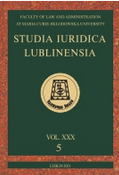Right to Court in Climate Matters in the Light of the Aarhus Convention and the Case Law of Polish Administrative Courts
Right to Court in Climate Matters in the Light of the Aarhus Convention and the Case Law of Polish Administrative Courts
Author(s): Anna KaliszSubject(s): Human Rights and Humanitarian Law, Environmental and Energy policy, Environmental interactions, Administrative Law
Published by: Wydawnictwo Naukowe Uniwersytetu Marii Curie-Sklodowskiej
Keywords: Aarhus Convention; climate protection; environmental law; climate law; human rights; administrative courts; case law;
Summary/Abstract: Climate law is a fast-developing branch of law. It is regulated in a multi-centric way, since as a global issue, it needs systemic solutions that would be broader than national ones. Climate protection can also be achieved through the implementation of human rights, including the right to court. Thus, the multi-level regulation as a lex generalis is accompanied with a lex specialis regulation governing the right to court from a collective perspective and linked strictly with climate law under Article 9 of the Aarhus Convention. The theoretical and indirect aim of the article is to emphasise the relationship of environmental law in general and climate law in particular with human rights, using the example of the right to court. The direct and practical aim is to demonstrate in a horizontal manner the role of the Convention in the case law of the Polish Supreme Administrative Court. The essence of the problem is the finding of the lack of direct effect of the Convention, which weakens this protection. The article is of a scientific and research nature and the analysis of the previous case law may have cognitive value for practice. The first part provides a theoretical and legal outline of introductory issues, showing the links between human rights and climate law and the scope of application of the Aarhus Convention. The second part, concerning research materials and methods, contains an analysis of the provisions of Article 9 of the Convention made using the logical-linguistic method and teleological interpretation. The third part shows the results of the interpretation search carried out by the Supreme Administrative Court, some of them being widely accepted and some controversial. Polish administrative courts, when deciding on environmental matters under Polish administrative law, co-apply together with Polish national law the normative acts of European law, including the Aarhus Convention. However, the wording of its provisions precludes, according to the established case law, the possibility of their direct application, thus pointing to the importance of legislative actions, and administrative courts cannot substitute the legislature in this activity. It was noted in the conclusion that the implementation of the Convention is “generally correct”, which does not mean, however, that it implements the Aarhus-type principles in full and comprehensive.
Journal: Studia Iuridica Lublinensia
- Issue Year: 30/2021
- Issue No: 5
- Page Range: 275-293
- Page Count: 19
- Language: English

